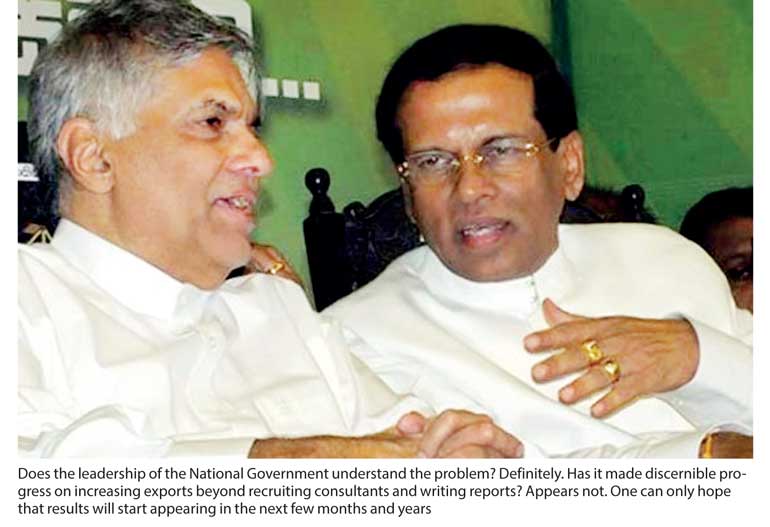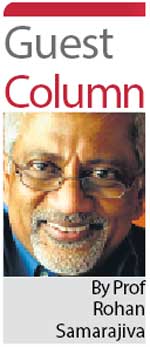Monday Feb 16, 2026
Monday Feb 16, 2026
Wednesday, 28 June 2017 00:00 - - {{hitsCtrl.values.hits}}
 Almost two years into its term, it is difficult to explain away the current Government’s lack of achievements on the economic front. I count the term of the Government from August 2015, rather than January 2015, because the focus in the extended first 100 days of the presidential term was on constitutional reform.
Almost two years into its term, it is difficult to explain away the current Government’s lack of achievements on the economic front. I count the term of the Government from August 2015, rather than January 2015, because the focus in the extended first 100 days of the presidential term was on constitutional reform.
The Foreign Ministry was responsible for the principal economic achievement, the restoration of duty-free access to the European Union under GSP Plus. Some exporters read the signs correctly and prepared to ramp up the volumes and thereby exploit the opportunity. But the Government’s communications have been so confused that not all were ready. So it may be another few months until the results can be seen in higher export earnings.
Increase in, and diversification of, exports is the keystone of Sri Lanka’s strategy to reach upper-middle-income status. It is also a necessary condition for ensuring that development occurring in the overall economy translates into enhanced well-being of citizens.
In 1990-91, an average household devoted 60.9% of its expenditures to food. The most recent Household Income and Expenditure Survey showed that by 2012-13 this had declined to 37.8%. As people become wealthier, they spend more of their income on non-food items that may be described as discretionary: more on transport, more on pilgrimages and entertainment, more on health and beauty care and so on. Even within the food category, consumption shifts from carbohydrates to protein. In a small economy with a stunted manufacturing sector such as ours, the result is greater demand for imports.
For example, the demand stimulation caused by the “bribing” of the population in the form of salary increases for Government employees, higher Mahapola and Samurdhi payments and so on around the 2015 elections caused higher consumption of imported goods.
For example, one out seven cars/vans on the road in 2016 had been registered in 2015. More than one out of 10 three-wheelers and two-wheelers on the road in 2016 had been bought in the previous year. All these came from outside as did the associated parts, lubricants and fuel.
It is very good that people realise their dreams. This is what development is about. But if we do not export more goods and services to match the growth of imports, the currency will naturally depreciate. Combined with the Government not managing its finances properly (recall the election-associated handouts that caused the 2015 spike in demand?), we are likely to see inflation rising.
Now the discretionary goods that people were beginning to enjoy will tend to become more expensive. The voter who was made happy by being able to buy new stuff is now likely to become unhappy because the new stuff is becoming more expensive.
If an election occurs around this time, the ruling party is likely to get thrown out, absent another round of voter bribing using public resources and/or coercion. But thanks to governance reforms such as the independent commissions and Right to Information, this kind of chicanery will not be as easy as in the past.
Does the leadership of the National Government understand the problem? Definitely. Has it made discernible progress on increasing exports beyond recruiting consultants and writing reports? Appears not. One can only hope that results will start appearing in the next few months and years.
Another thing the Government can do to energise the economy is to reform infrastructure services. For example, the Colombo Port  had begun to slide toward inefficiency in the 1990s. The introduction of competition and private-sector participation through the SAGT public-private partnership in the late 1990s rejuvenated the port. The construction of the deep-water South Harbour and the second public-private partnership in the form of the CICT container terminal in the next decade further improved things.
had begun to slide toward inefficiency in the 1990s. The introduction of competition and private-sector participation through the SAGT public-private partnership in the late 1990s rejuvenated the port. The construction of the deep-water South Harbour and the second public-private partnership in the form of the CICT container terminal in the next decade further improved things.
Three benefits accrued to the economy: unlike other State-Owned Enterprises, the Port Authority does not demand support from the taxpayer; the increased volumes of containers trans-shipped by the three terminal operators constitute increased service exports; because of the volumes attracted by the efficiency of the terminal operators, big ships with direct sailings are attracted to the port. The latter benefits Sri Lankan goods exporters in terms of shorter time to market and lower costs.
Have any such reforms of sectors that can benefit the economy as a whole been completed in the past two years? Have such reforms been initiated? Appears not. Has any action been taken to at least stop taxpayers having to bear the burden of perpetually money-losing state-owned enterprises, despite an entire Ministry being created for that purpose? No.
When Ranil Wickremesinghe was Prime Minister the last time around, the Government he headed completed such reforms in multiple infrastructure sectors within its first two years (that was all it was given before the then President pulled the plug): the Sri Lanka Telecom IPO was successfully completed, bringing State ownership to below 50%; the international telecom services market was liberalised; competition was introduced to the fuel distribution market; the India-Sri Lanka air services market was liberalised.
But the timing was off. The benefits could not be seen by the time elections were called. For example, growth in the burgeoning BPO sector, just one new sector brought into being by that Government, kicked in only around 2006, after the people who did the reforms had been consigned to the opposition. But the reforms had been done. The thousands of new jobs that had been created and the millions in service export earnings continue to benefit the economy year after year.
Why is performance lackadaisical this time around?
Is it because the Prime Minister is working on a five-year plan whereby the results will emerge just before the 2020 elections? Because voters have short memories it may be thought that timing is everything.
Is it because he’s distracted by Constitution making and keeping the peace within an ungainly coalition? But recall he was dealing with Prabhakaran and peace negotiations back in 2002. Is it because the State machinery has been so weakened that it cannot deliver? Unspent allocations in Ministries ranging from Education and Disaster Management support this thesis.
Or that the current Government is incapable of assembling a team that can produce results at the required pace?
One can only hope for a mid-course correction that will produce results that people can feel in their pocketbooks before the next election. Otherwise the voter is going to revert to their feudal default thinking and say “enough with all this democratic nonsense that produces no discernible benefits to our well-being, let’s get ourselves a king”.